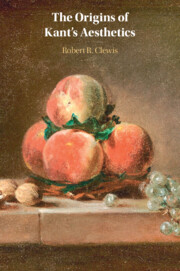Book contents
- The Origins of Kant’s Aesthetics
- The Origins of Kant’s Aesthetics
- Copyright page
- Dedication
- Contents
- Figures
- Acknowledgments
- A Note on Citations
- Abbreviations
- Introduction
- Part I Aesthetic Judgment and Beauty
- Part II Genius and the Fine Arts
- 4 Genius, Thick and Thin
- 5 Classifying the Fine Arts
- Part III Negative and Positive States
- Closing Reflections
- Bibliography
- Index
4 - Genius, Thick and Thin
from Part II - Genius and the Fine Arts
Published online by Cambridge University Press: 10 January 2024
- The Origins of Kant’s Aesthetics
- The Origins of Kant’s Aesthetics
- Copyright page
- Dedication
- Contents
- Figures
- Acknowledgments
- A Note on Citations
- Abbreviations
- Introduction
- Part I Aesthetic Judgment and Beauty
- Part II Genius and the Fine Arts
- 4 Genius, Thick and Thin
- 5 Classifying the Fine Arts
- Part III Negative and Positive States
- Closing Reflections
- Bibliography
- Index
Summary
Chapter 4 explores Kant’s theory of genius. The chapter avoids the well-discussed question about whether or why Kant denied that scientific activity requires or displays genius. It instead asks whether, in Kant’s view, genius can produce original nonsense. Is taste a component of genius, or does taste impose constraints on genius as if from the outside? The chapter maintains that Kant takes up two distinct conceptions of genius, the thin and the thick. Both conceptions can be found in Kant’s early thoughts about genius. When the two notions are retained in the third Critique, it creates internal tensions.
- Type
- Chapter
- Information
- The Origins of Kant's Aesthetics , pp. 103 - 128Publisher: Cambridge University PressPrint publication year: 2023

